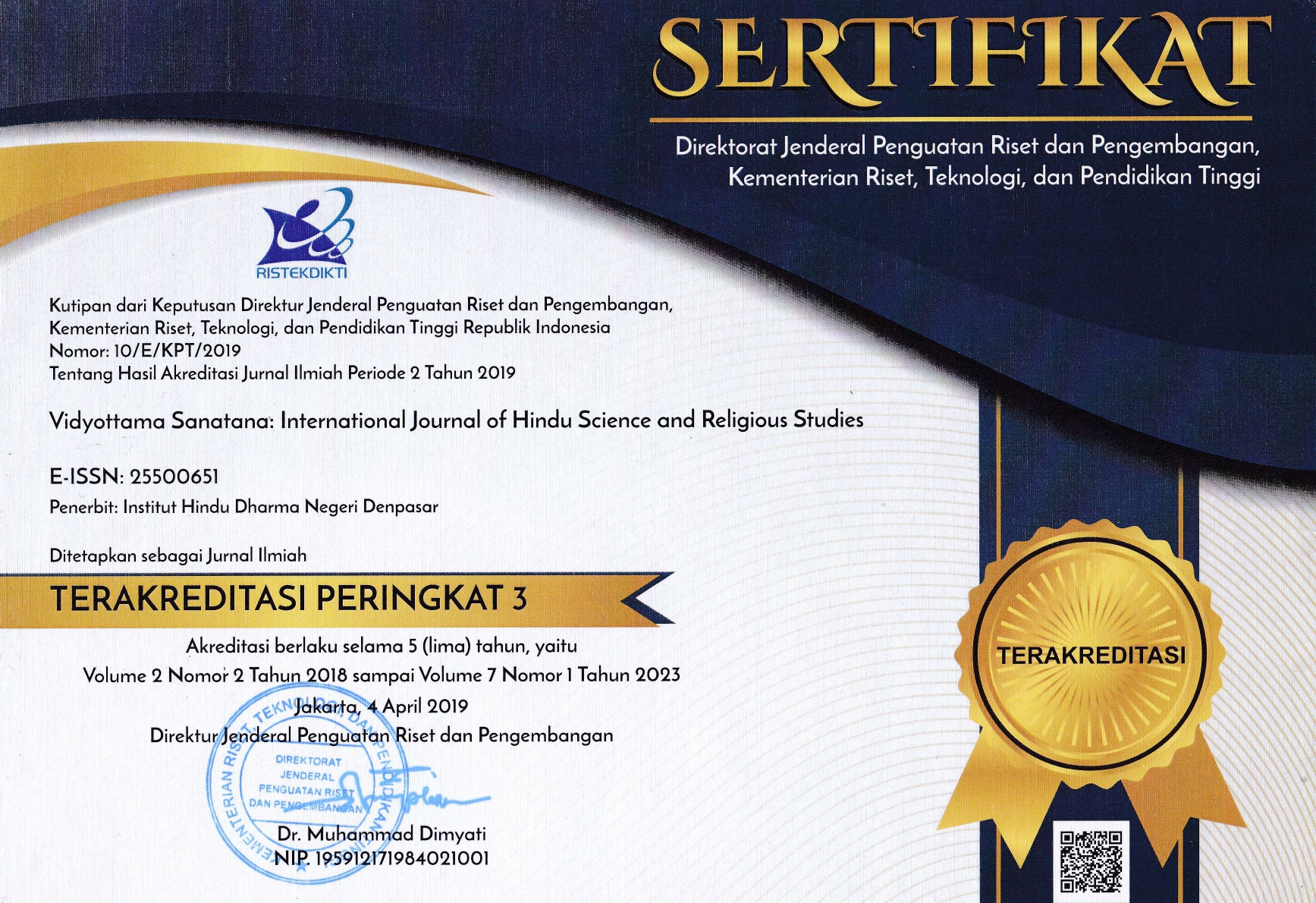SHIFTING THE MEANING OF TABUH RAH BECOMES TAJEN (COCKFIGHTING) IN BALI (THE PERSPECTIVE OF MAX SCHELER'S HIERARCHY OF VALUES)
DOI:
https://doi.org/10.25078/vidyottama.v7i1.162Keywords:
Tabuh Rah, Tajen, Hierarchy of Value, Max SchelerAbstract
Bali has kept various forms of unique traditions, different from other regions. Like one of them is the
tradition of tabuh rah. This tradition is part of a ritual or yajna carried out by the Balinese Hindu
community. In this tradition, the facilities used are two roosters pitted against each other. The blood
from the chicken will be used as a tabuh rah. However, the tabuh rah ritual has changed its meaning
to become tajen. Several factors influence this change and one of them is the implementation of a
hobby owned by Balinese men, which is known as a bebotoh hobby. This article explores the values
in the shift in meaning from the tabuh rah ritual to the tajen by using the philosophical hermeneutic
method from data obtained through library research. The results of this study are 1). The value
contained in the tabuh rah ritual can be explained in the form of Max Scheler's hierarchy of values.
The highest value is the values of the holy as a sacred ritual and aims to perfect the animal's spirit
to be sacrificed. The spiritual value seen from the tabuh rah ritual is the implementation of
tantrayana teachings. The vital value can be seen from the purpose of the tabuh rah ritual as the
implementation of the Tri Hita Karana teachings last is the value of pleasure. 2). There is a shift in
values from the tabuh rah ritual to tajen. 3). The value to be achieved in tajen is the value of pleasure,
which is a form of channelling a hobby and wanting to win from the gamble. Thus, other values are
neglected.
References
Andrianto, H. (2003). Perjudian Sabung Ayam di Bali. Jakarta: Pascasarjana Universitas Indonesia.
Angel, W. W., Sinaga, R. M., & Suparman, A. (2019). Tabuh Rah pada Ritual Yajna Masyarakat Bali di Desa Balinuraga Kecamatan Way Panji. Universitas Negeri Lampung, 2(01).
Arini, I. A. D., & Paramita, I. B. G. (2021). Eksistensi Ajaran Tantrayana dalam Kehidupan Beragama Hindu di Bali. Jnanasiddhanta: Jurnal Prodi Teologi Hindu, 2(2), 8–16.
Ayodhya A., I. D. M. (2020). Konstruksi Sosial Penjudi (Bobotoh) atas Realitas Sabung Ayam (Tajen) di Desa Babahan, Bali. Journal of Chemical Information and Modeling.
Bakker, A., & Zubair, A. C. (1990). Metodologi Penelitian Filsafat. Yogyakarta: Kanisius.
Diksyiantara, I. B. G. E., Punia, I. N., & Kamajaya, G. (2016). Tajen & Desakralisasi Pura: Studi Kasus di Desa Pakraman Subagan, Kecamatan Karangasem, Bali. Jurnal Ilmiah Sosiologi Fakultas Ilmu Sosial Dan Ilmu Politik Universitas Udayana, 1–16.
Frondizi, R. (2011). Pengantar Filsafat Nilai. Diterjemahkan oleh Cuk Ananta Wijaya (III). Yogyakarta: Pustaka Pelajar.
Gunarta, I. K. (2019). Transformasi Tabuh Rah Menjadi Tajen di Desa Adat Batur Rening Kecamatan Abiansemal Kabupaten Badung Provinsi Bali: Kajian Teologi Hindu. Jurnal Penelitian Agama Hindu: Jayapangus Press, 3(2), 127–134.
Hidayat, R. (2011). Sabung Ayam Tabuh Rah dan Judi Tajen di Bali (Perspektif Hukum Islam dan Hukum Positif) [Jakarta: UIN Syarif Hidayatullah].
Kniten, I. P. P. P., & Gunanta, P. I. N. (2005). Tinjauan Tabuh Rah dan Judi. Paramita: Surabaya.
Mertha, I. K. (2010). Politik Kriminal Dalam Penanggulangan Tajen (Sabung Ayam) di Bali (I). Denpasar: Udayana University Press.
Remaja, I. N. G. (1999). Makna Sabungan Ayam dalam Perspektif Agama Hindu. Pariksa: Jurnal Hukum Hindu STAHN Mpu Kuturan Singaraja, 1, 36–44.
Sari, N. P. S. Y., & Wirasila, A. A. N. (2019). Tinjauan Kriminologi Terhadap Perjudian Sabung Ayam (Tajen) yang Berkedok Tabuh Rah di Bali. Bali: Universitas Udayana.
Suseno, F. M. (2000). 12 Tokoh Etika Abad Ke-20. Yogyakarta: Kanisius.
Suseno, F. M. (2006). Etika Abad Kedua Puluh. Yogyakarta: Kanisius.


















